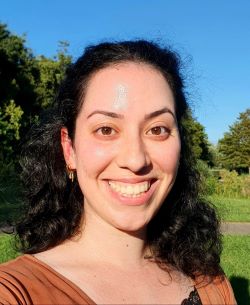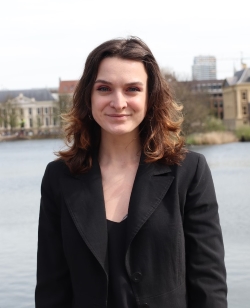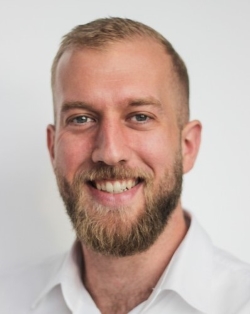
Student and staff representation in challenging times: ‘We need each other more than ever’
The bodies representing student and staff interests met at the start of the academic year for a day of training. New and familiar faces had come together to learn more about their role as council members and meet the Executive Board − and each other.
Pauline Vincenten, Chair of the University Council, opened the event in a full room in the Academy Building. ‘We really value participation at Leiden University. Student and staff representation of our academic community is crucial to proper decision-making’, she stressed. ‘Be it positive or critical, feedback is extremely valuable to the boards of our institutes, services and faculties as well as at a central level.’
Seeking connections
The training day allows members of the representation bodies to learn more about their roles and meet other members of such bodies. A buddy system brings members of the University Council, faculty councils and employee councils together so they can exchange ideas. Leiden University is a complex organisation and collaboration is crucial to finding answers to wider issues. ‘One thing is clear: connection is essential to representation work’, said Vincenten.
‘One thing is clear: connection is essential to representation work’
Crucial link
The impact of the announced government cuts was a common theme at the meeting. ‘They will affect us all. Research, teaching, operations, management and governance’, said Martijn Ridderbos, Vice-Chairman of the Executive Board. This makes it the responsibility of the participation bodies to represent their constituents when they advise and vote on the budget.
With much still uncertain on the day of the meeting, the Executive Board said it was considering ‘optimistic’ and ‘pessimistic’ scenarios. ‘Participation, either centralised or decentralised, is a crucial link between the boardroom and the office and lecture hall. The board and participation bodies need each other more than ever’, said Ridderbos.
Range of different topics
Besides the impact of the coalition agreement, other topics are high on the agenda including implementing the university’s sustainability plan and the university discussion about security measures. And this year, in line with the vision on Recognition and Rewards, GROW was introduced to replace the Performance and Development Interview. Then there is the ambition to strengthen regional collaborations, while the Executive Board plans to discuss its collaboration with the University Council this autumn. To be able to voice their opinions on these different issues, the members of the various representation bodies first need to know their roles and rights; learning more about these was one of the objectives of the training day.
‘Keep us on our toes’
Vincenten urged the participation bodies to speak out and stay curious. ‘It can be difficult for university managers and policy officers to understand how students and staff experience their work and studies and how new policies will affect them. As council members you are close to them.’ The board and various participation bodies all serve the same interests: those of the university and the academic community. ‘Keep us on our toes’, were Rector Magnificus Hester Bijl’s concluding words.
What motivates our student and staff representatives?

Tahmina Fariaby – University Council – PhDoc
‘I think it is important to stand up for the interests of the PhD candidates and postdocs at our university, particularly those with a grant or without a funded place. I want to improve the position of these PhD candidates. What I would also really like to achieve is the role of a central postdoc coordinator − at present not a single FTE is dedicated to postdoc policy and support. I am committed to achieving these goals: a gem cannot be polished without friction!’

Dominika Byrtusová – Faculty Council FGGA
‘As an international student at Leiden University, I am here to represent the voices of people who may feel underrepresented or muted by the large Dutch community on campus. I would like to improve the emergency information available to students and staff by creating a pamphlet documenting the procedures and exits in the buildings. Another focal point for me would be implementing a concrete and fair system for enrolling on elective courses for the Crisis and Security Management programme. Lastly, I would like to voice the concerns of my fellow FGGA students so their voices can be heard, and thus represent the values of the Democratic Students Party (DSP).’

Joost van den Berg - Faculty Council Humanities
‘I became a representative because I want to help improve the communication between students, staff and university management. By actively participating and representing the interests of the academic community, we can make our work environment even better. In the coming year, I want to work on staff engagement, clearer decision-making processes and forward-looking decisions about our financial situation. I also hope to increase the visibility of the faculty councils so everyone will feel more involved in making our university that bit better.’
About the student and staff participation
The participation bodies represent student and staff interests. Various bodies at Leiden University have the right to consent and advise: the faculty boards for faculty affairs, and the University Council for university affairs. Other bodies with these powers include the Local Consultative Body, the staff councils and the programme committees. Members of the participation bodies are democratically elected during the university elections.
Text: Iris Molenaar
Banner image: Scholingsdag Medezeggenschap
